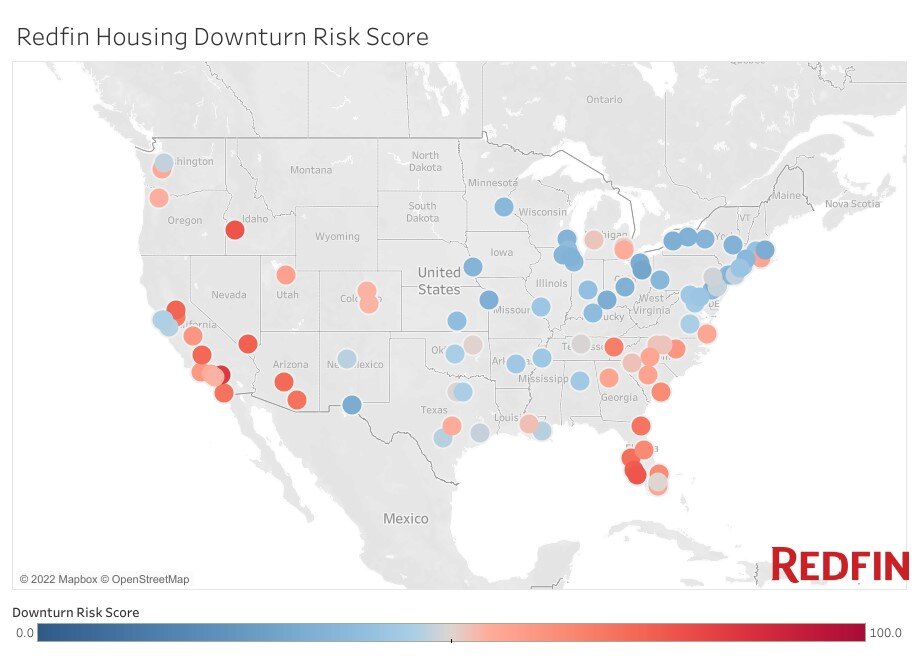
U.S. Housing Markets with Steep Price Increases During Covid Most Susceptible to Housing Downturns in a Recession
Based on new research from national property broker Redfin, popular migration destinations where home prices soared during the pandemic are most likely to see the effects of a housing downturns amplified and home prices decline year over year if the economy goes into a recession. Redfin also found that relatively affordable northern metros are most resilient in the event of a recession.
The U.S. housing market also slowed considerably in the spring, with 5.5%-plus mortgage rates sending many buyers to the sidelines and cooling competition, said Redfin.
“Recession fears are escalating, mostly because the Fed has signaled it will continue to raise interest rates to tame inflation and cool consumer demand. Higher interest rates led to surging mortgage rates, which have already cooled down the housing market,” said Redfin Senior Economist Sheharyar Bokhari. “If the U.S. does enter a recession, we’re unlikely to see a housing-market crash like in the Great Recession because the factors affecting the economy are different: Most homeowners have a fair amount of home equity and not much debt and unemployment is low.”
“But a recession-or even a continued economic downturn that doesn’t reach recession levels-would impact some local housing markets more than others, and there are a few factors that put certain areas at risk,” Bokhari continued. “First, what goes up must come down. Home prices soared at an unsustainable rate in many pandemic homebuying hotspots. Additionally, places where people tend to have high debt compared with their income and home equity are vulnerable because their residents are more likely to foreclose or sell at a loss.”
Even in the most vulnerable parts of the country, most homeowners are likely to remain on solid footing, Bokhari said. Home values may drop from the peak they reached in 2021 and early 2022, but the decline is only on paper for homeowners who are staying put for at least a few years, as values typically increase over time.
Migration destinations with rapidly rising home prices are most at risk of a continued housing downturn
Riverside, CA has the highest chance of seeing its housing market cool further if the U.S. enters a recession. It has an overall risk score of 84, the highest of any major U.S. metro. That means a combination of housing and economic data indicate it’s more likely than other metros to see prices decline year over year during a recession or continued economic downturn. Riverside, which spans from eastern suburbs of Los Angeles like San Bernardino and Ontario through the Palm Springs area, has highly volatile home prices and it was a hot destination during the pandemic, both for people permanently relocating and those buying second homes.
Riverside is followed by Boise (76.9), Cape Coral, FL (76.7), North Port, FL (75) and Las Vegas (74.2). Sacramento, CA (73.1), Bakersfield, CA (72.2), Phoenix (72), Tampa, FL (70.7) and Tucson, AZ (70.1) round out the top 10.
Like Riverside, many of those housing markets are popular migration destinations and/or places with rapidly rising home prices, both factors that are major contributors to their risk of suffering from a housing downturn. Additionally, Boise, Cape Coral, North Port, Las Vegas, Sacramento and Phoenix were all among the 20 fastest-cooling markets as of May, when mortgage rates approached 5.5%. That’s an indicator that prices are more likely to drop in many of those metros as the economy continues to contract.
Six of the 10 areas most at risk of downturns are among the most popular destinations for Redfin.com users moving from one metro to another. Maricopa County (Phoenix) and Riverside County gained more residents from other parts of the U.S. than anywhere else in 2021, according to the U.S. Census.

Source: THE WORLD PROPERTY JOURNAL
We are ready to boost your Returns With our Ideal Property management Services In Orlando or answer your inquiries Here: https://bullpropertymanagement.com/contact/
